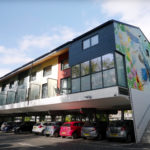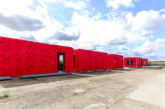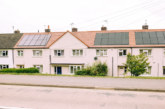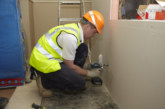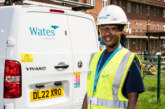Dr. Ellen Grist, Research and Evaluation Lead at Bristol Housing Festival and Debansu Das, Business Development Director at ZED PODS, discuss the Hope Rise Post-Occupancy Report, which shows how innovation can unlock affordable, carbon neutral homes.
A recent post-occupancy evaluation, funded by Commonweal Housing, on ZED PODS’ Hope Rise is a reminder of how important it is to be conducting this kind of research to help unlock quality homes at scale and pace. As the RIBA recently said: “If the construction sector is serious about reform and improvement, it needs to embrace post-occupancy evaluation.”
Hope Rise is a multiple award-winning development of 11 social homes for young adults in Bristol. These modular homes are constructed on a steel podium above an operational public car park in St. George, Bristol. The scheme is part of a wider Innovate UK funded Research and Development project, ‘Enabling Housing Innovation for Inclusive Growth,’ implemented by a consortium of partners led by YTKO and including Bristol City Council, Bristol Housing Festival, BRE, and nine leading modular housing companies in 2020.
This demonstrator project was built on the belief that innovative building methods have the potential to unlock affordable homes and also contribute to tackling the construction sector’s goal to reach net zero targets. Cllr Tom Renhard, Cabinet Member for Housing Delivery and Homes said: “Hope Rise has shown us that innovation is essential as we seek to deliver homes fit for the future to meet Bristol’s housing need. We hope the learning from this pilot project will lead to the design and delivery of hundreds if not thousands of homes.”
Hope Rise was the first completed project amongst those nine housing schemes involved in the Innovate UK demonstrator project and was then showcased by the Construction Leadership Council and BEIS at ‘Build Better Now’, a virtual exhibition during COP26. Hope Rise was the only residential modular project from the UK amongst 17 exemplary sustainable projects across the globe.
Given the objectives of the project, post-occupancy evaluation was a key priority from the outset. Ellen Grist, Research and Evaluation Lead at Bristol Housing Festival said: “Hope Rise is a truly innovative development that has increased the capability and confidence of the whole supply and demand ecosystem, and the learning in this report has the potential to enhance the design and delivery of hundreds if not thousands of homes.”
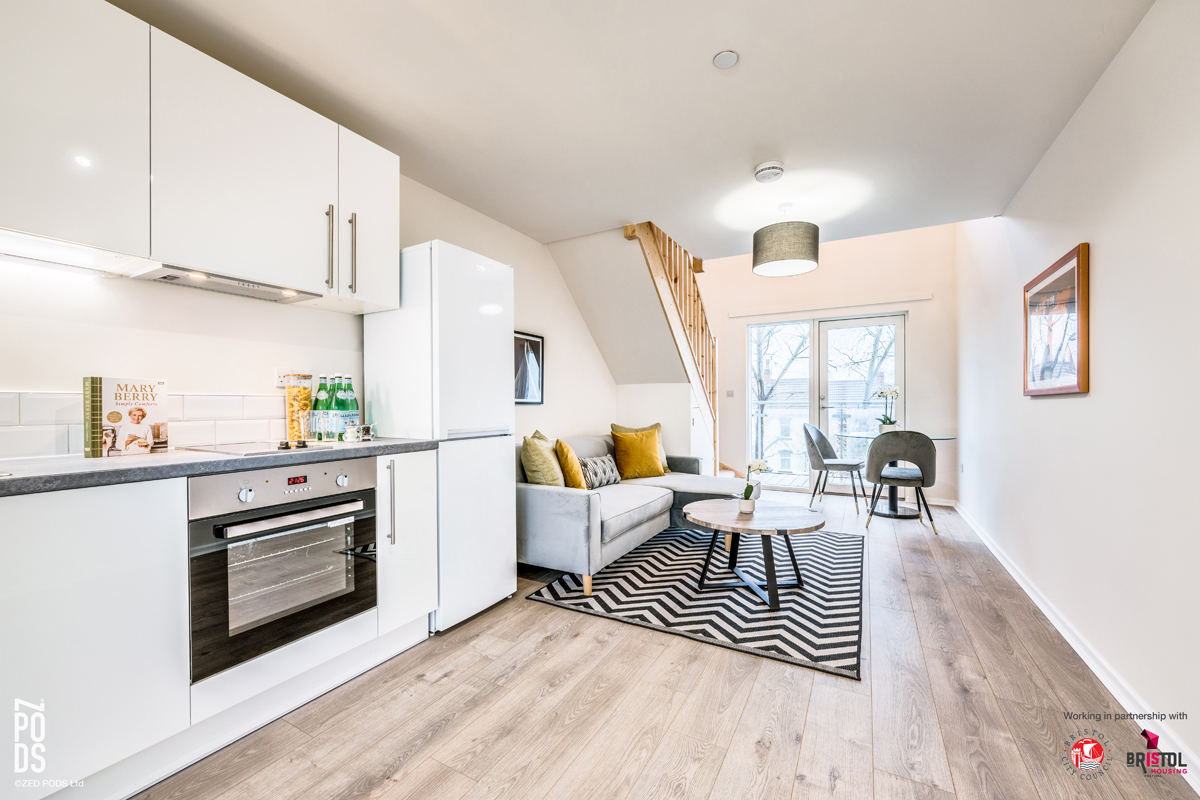
The Hope Rise Journey
Hope Rise, as a first-of-its-kind, overcame many barriers. Building homes above an operational car park using a modular construction methodology was new for all stakeholders. However, a collaborative approach and early stakeholder engagement activities, including the mural design, helped to win the hearts and minds of the local community.
The successful outcome of planning application, undertaken by ZED PODS at their own risk, instilled confidence and helped unlock the construction of the UK’s first social housing scheme utilising ‘air-rights.’ ZED PODS’ proprietary build system enabled the homes to be built in 23.5 weeks despite Covid-19 restrictions across the country. This was ZED PODS first social housing project and delivery times are likely to be further condensed as the supply system matures.
Why Post-Occupancy Evaluation matters for MMC
Post-occupancy evaluation is thought to be more valuable than ever as offsite construction shifts delivery models towards a manufacturing process, and importantly also a product mindset. In this context feedback loops, expressly seeking out and capturing the preferences and experience of users, enables iteration within production cycles, with the ability to rapidly improve future product lines and in turn raise the quality of new homes on the market and raise the bar for new entrants. The Cambridge Centre for Housing & Planning Research, in their paper Customer experience in the housebuilding industry: POE of MMC-delivered homes (2022), highlight the ‘substantial advantages’ for those housebuilders who begin to ‘build the capabilities and skills and evolve their organisational structures to integrate Customer Experience (CX) programs of the future,’ which they describe as being ‘holistic, predictive, precise and clearly tied to business outcomes’ as opposed to reliant on traditional customer-satisfaction surveys and metrics.
The post occupancy evaluation of Hope Rise found that utilising air-rights over an operational council-owned car park, and thus eliminating land costs, made this 100% affordable development of high-quality, energy-efficient new council homes viable. With rental figures of £370pcm for the one-bed units, and energy bills averaging £46pcm, these energy-efficient homes have been demonstrated to be affordable to residents in receipt of the Local Housing Allowance.
Social innovation and the peer-to-peer support model
Recognising that young adults moving into their first homes need more than just a roof over their heads, this development also piloted an innovative peer-to-peer support model, in which a team of four ‘Community Builders’ were recruited to be proactive in building community with the other residents. At the time of moving in, four of these residents were working, four were not in education, employment, or training (NEET) and one was in college. One year on, six were working, one was NEET, one was in college, and one was doing an apprenticeship. The post-occupancy evaluation showed that two thirds of the young adults chose to engage with the Community Builders, some residents preferred to be less engaged, but all the residents know each other’s names and helped each other with basic practical tasks. All four Community Builders have recommended this model to be replicable, subject to learning from this pilot.
Energy Performance
Finally, the report found that because the ZED PODS homes were fitted with latest renewable technologies like solar panels on the roof, heat pumps, and triple glazed doors and windows, they are zero carbon in operation. The post occupancy evaluation study shows that 104% of the annual energy usage is generated onsite by the roof solar panels.
Tom Northway, Chairman of ZED PODS, is “extremely pleased with the performance of the building during occupancy which has improved wellbeing of its residents and made a positive impact on local community. This scheme, designed by ZED PODS’ inhouse architectural team, and built using the propriety build system, demonstrates how superior energy-efficient affordable homes can be built on constrained infill sites. This is an outstanding result of truly collaborative work which has changed the lives of young people.”
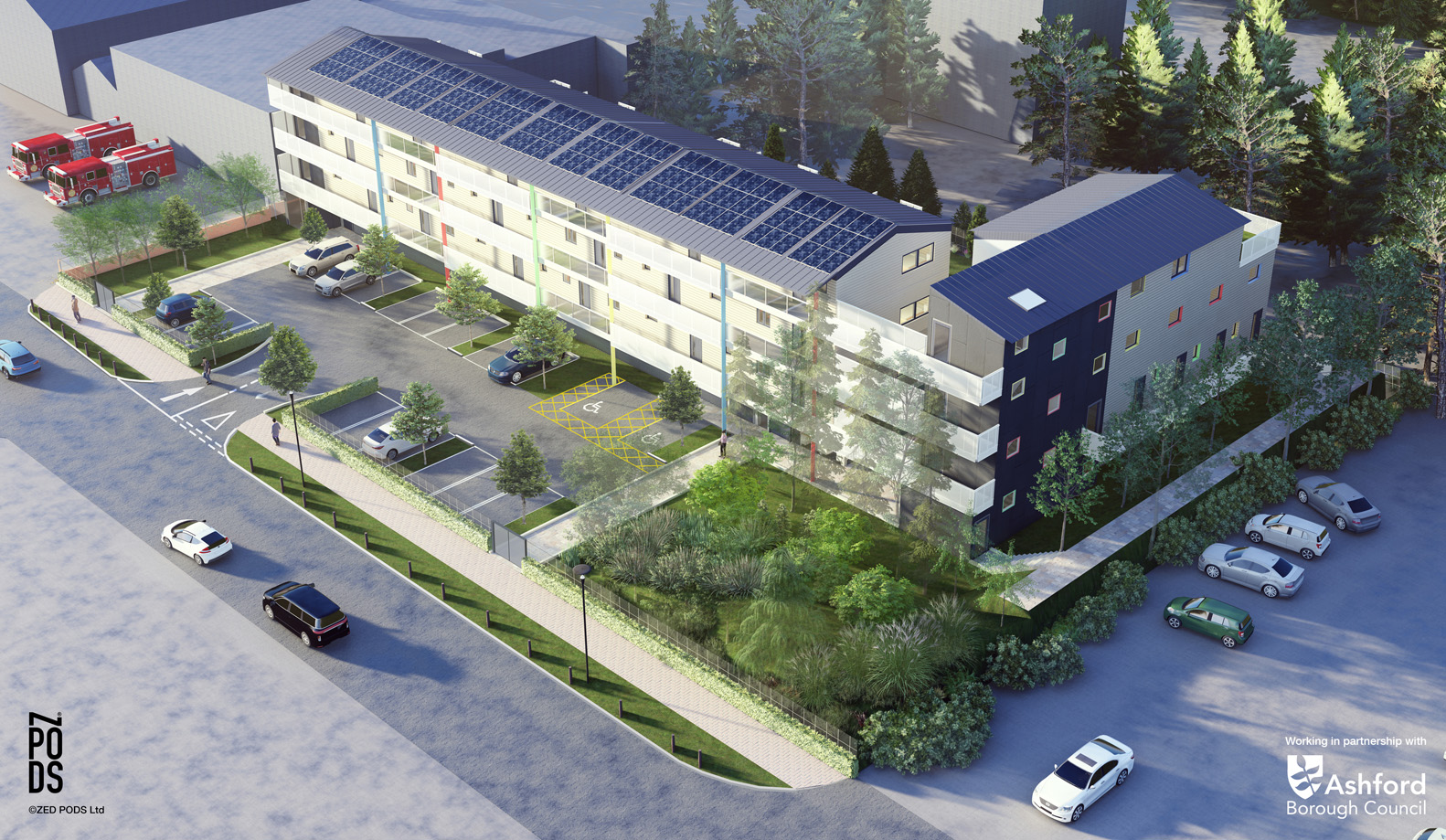
Further innovation this pilot and post-occupancy evaluation has helped unlock:
The Hope Rise scheme has influenced other local authorities in the UK to rethink their brownfield and unused sites and embrace modern methods of construction to deliver faster, good quality, well-designed, affordable homes. It has also encouraged ZED PODS’ inhouse architectural team to push the boundaries and apply podium-based housing solution to difficult-to-build sites like Flood Zones and above existing residential buildings or multistorey car parks.
ZED PODS have since applied the design principle for Hope Rise successfully for a 23-unit scheme in Ashford. The zero carbon homes will be built on a steel podium in a Flood Zone 3 area and will be the local authorities’ first modular scheme. Their inhouse design team have incorporated all the necessary safety features and flood risk mitigation measures for this social housing due to the site’s location. The project has received planning permission from the Local Planning Authority and go-ahead from the Environment Agency.
Similar planning success has been obtained by ZED PODS for another social housing project in Tiverton for Mid-Devon District Council. The site is in the Flood zone area and is set to be operationally carbon neutral, making this one of the first social housing projects of this type within the district and continuing the local council’s ambition towards being carbon zero by 2030.
A demonstrator project, in conjunction with a post-occupancy evaluation, has been shown to be an effective model for unlocking this innovative housing solutions, and has been seen to lead to further innovation. Bristol is leading the way in exploring and showcasing innovative approaches to tackling the housing crisis, climate, and ecological emergencies, and is calling on other cities to be bold implementing and evaluating innovative housing solutions. Doing so has been shown to help new modular providers enter the market, shape their new housing products and delivery services, and unlock a supply chain of affordable, carbon zero homes.
Header image shows Hope Rise in Bristol ©ZED PODS Limited.

